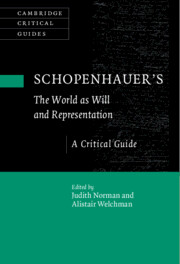Book contents
- Schopenhauer’s The World as Will and Representation
- Cambridge Critical Guides
- Schopenhauer’s The World as Will and Representation
- Copyright page
- Contents
- Contributors
- Acknowledgments
- Note on Texts, Translations, and Abbreviations
- Introduction: Schopenhauer in the Time of Pandemic
- Chapter 1 Different Kinds of Willing in Schopenhauer
- Chapter 2 Resignation
- Chapter 3 Appreciating Nature Aesthetically in The World as Will and Representation: Between Kant and Hegel
- Chapter 4 The Hour of Consecration: Inspiration and Cognition in Schopenhauer’s Genius
- Chapter 5 Experiencing Character as a Key for a Present-Day Interpretation of Schopenhauer
- Chapter 6 Schopenhauer in Dialogue with Fichte and Schelling: Schopenhauer’s Critique of Moral Fatalism and His Turn to Freedom from Willing
- Chapter 7 Schopenhauer’s Philosophy of Religion: (Hopeless) Romanticism?
- Chapter 8 Maja and Nieban in The World as Will and Representation
- Chapter 9 Schopenhauer, Universal Guilt, and Asceticism as the Expression of Universal Compassion
- Chapter 10 Seeing Things: Schopenhauer’s Kant Critique and Direct Realism
- Chapter 11 The Sciences in The World as Will and Representation
- Chapter 12 Pushing Back: Reading The World as Will and Representation as a Woman
- References
- Index
- Cambridge Critical Guides
Chapter 6 - Schopenhauer in Dialogue with Fichte and Schelling: Schopenhauer’s Critique of Moral Fatalism and His Turn to Freedom from Willing
Published online by Cambridge University Press: 08 December 2022
- Schopenhauer’s The World as Will and Representation
- Cambridge Critical Guides
- Schopenhauer’s The World as Will and Representation
- Copyright page
- Contents
- Contributors
- Acknowledgments
- Note on Texts, Translations, and Abbreviations
- Introduction: Schopenhauer in the Time of Pandemic
- Chapter 1 Different Kinds of Willing in Schopenhauer
- Chapter 2 Resignation
- Chapter 3 Appreciating Nature Aesthetically in The World as Will and Representation: Between Kant and Hegel
- Chapter 4 The Hour of Consecration: Inspiration and Cognition in Schopenhauer’s Genius
- Chapter 5 Experiencing Character as a Key for a Present-Day Interpretation of Schopenhauer
- Chapter 6 Schopenhauer in Dialogue with Fichte and Schelling: Schopenhauer’s Critique of Moral Fatalism and His Turn to Freedom from Willing
- Chapter 7 Schopenhauer’s Philosophy of Religion: (Hopeless) Romanticism?
- Chapter 8 Maja and Nieban in The World as Will and Representation
- Chapter 9 Schopenhauer, Universal Guilt, and Asceticism as the Expression of Universal Compassion
- Chapter 10 Seeing Things: Schopenhauer’s Kant Critique and Direct Realism
- Chapter 11 The Sciences in The World as Will and Representation
- Chapter 12 Pushing Back: Reading The World as Will and Representation as a Woman
- References
- Index
- Cambridge Critical Guides
Summary
Manja Kisner stresses Schopenhauer’s continuity with Fichte and Schelling through Fichte’s concept of the intelligible subject as a nexus of ethical drives that tend toward an ethical world order. Schopenhauer rejected so much of this concept that we often miss the positive influences. Kisner points to the fact that Fichte was discussing agency in terms of drives, and responding to the problem of illicitly positing a causal relationship between the intelligible and empirical registers. Schopenhauer disagrees with Fichte’s idea that the intelligible world is a sort of moral destination, his moral fatalism. Kisner sees WWR as a reply to Fichte on this account. Schelling furthers the development toward Schopenhauer, however, by abandoning moral fatalism, and seeing the possibility of moral as well as immoral action, as contingent (not fatalistic) and rooted in an irrational, amoral ground. Schopenhauer can be seen as continuing and radicalizing it. He accepted Schelling’s notion of an amoral ground of being, but viewed it as an occasion for a negative rather than a positive morality. Freedom comes not from grounding oneself in the will and acting rationally, but from resisting the will altogether. Still, this theoretical move presupposes the philosophical tools developed by Schopenhauer’s contemporaries.
Information
- Type
- Chapter
- Information
- Schopenhauer's 'The World as Will and Representation'A Critical Guide, pp. 123 - 141Publisher: Cambridge University PressPrint publication year: 2022
Accessibility standard: Unknown
Why this information is here
This section outlines the accessibility features of this content - including support for screen readers, full keyboard navigation and high-contrast display options. This may not be relevant for you.Accessibility Information
- 1
- Cited by
